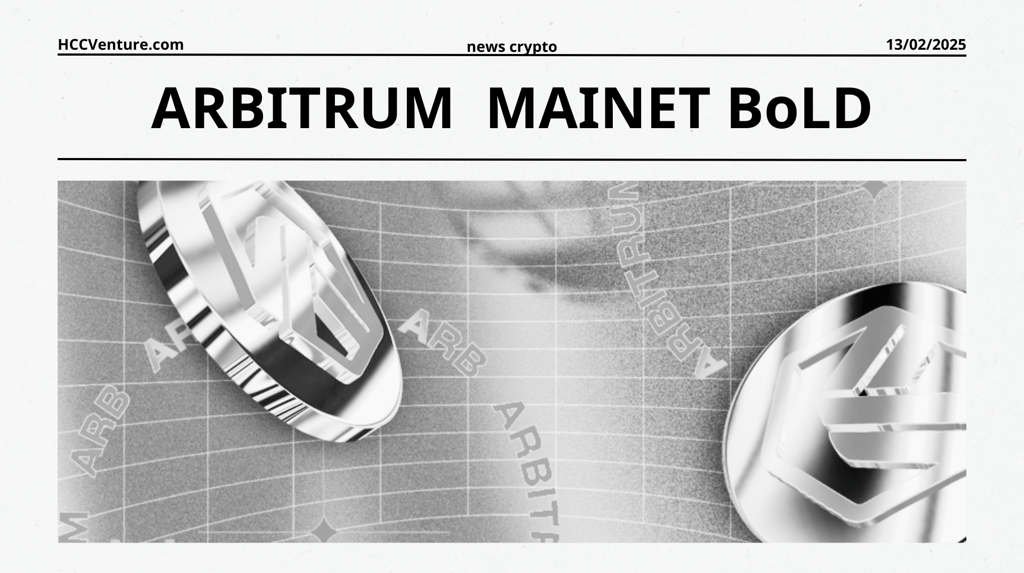Arbitrum Deploys BoLD Authentication Mechanism Mainnet – Enhancing Decentralization and Security
Arbitrum has officially deployed the BoLD (Bounded Liquidity Delay) protocol on mainnet, allowing anyone to participate in permissionless network state validation. This move aims to enhance the decentralization and security of Arbitrum's Layer-2 ecosystem.
2/13/20251 min read


On February 12, 2025, Arbitrum officially launched Bounded Liquidity Delay (BoLD) – a new, permissionless authentication mechanism that allows anyone to participate in monitoring the network state. This is an important step towards increasing the security and decentralization of the Layer-2 ecosystem on Ethereum.
Arbitrum and BoLD Authentication Mechanism
Arbitrum is a Layer-2 solution based on the Optimistic Rollup model , which increases Ethereum's scalability by processing transactions off-chain and only writing aggregated data to the Ethereum mainnet. This reduces congestion and transaction costs while ensuring security.
The BoLD protocol upgrades Arbitrum's fraud-proof mechanism by introducing a fixed-time dispute resolution system . Accordingly, all disputes will be resolved within approximately 12 days on the Arbitrum chains.
The core of BoLD is to allow anyone to participate in validating and challenging suspicious transactions . Previously, the system only allowed a select number of validators to participate in securing the network, but BoLD replaces this mechanism with an open model , making the network more decentralized .
Offchain Labs said that although Optimistic Rollup has a security mechanism that uses a 7-day challenge period to conduct fraud-proofing, the network can still be subject to DDoS attacks , causing withdrawals and status confirmations to be delayed indefinitely . Therefore, the validation process previously required strict control, causing a limit on decentralization .
BoLD is not only a technical innovation, but also has a significant impact on Arbitrum's entire operating model:
Permissionless Authentication : Any third party can participate in the monitoring process, ensuring absolute transparency.
Mitigating Attack Risk : This mechanism helps to limit attacks from malicious validators.
Cost & Performance Optimization : The system operates more efficiently without increasing transaction load.
Increased decentralization : Eliminates dependence on a small number of validators, increasing community trust.
The implementation of BoLD is important in the context of Layer-2 becoming the optimal solution for scaling Ethereum:
Safer DeFi : Decentralized finance protocols will have an additional layer of strong protection.
Higher Scalability : BoLD helps the Arbitrum network process transactions quickly while still ensuring security.
Attract more developers : With a transparent authentication mechanism, Arbitrum can become the top choice for Web3 projects.
Explore HCCVenture group
HCCVenture © 2023. All rights reserved.

Connect with us
Popular content
Contact to us
E-mail : sp_contact@hccventure.com
Register : https://linktr.ee/holdcoincventure
Disclaimer: The information on this website is for informational purposes only and should not be considered investment advice. We are not responsible for any risks or losses arising from investment decisions based on the content here.


TERMS AND CONDITIONS • CUSTOMER PROTECTION POLICY
ANALYTICAL AND NEWS CONTENT IS COMPILED AND PROVIDED BY EXPERTS IN THE FIELD OF DIGITAL FINANCE AND BLOCKCHAIN BELONGING TO HCCVENTURE ORGANIZATION, INCLUDING OWNERSHIP OF THE CONTENT.
RESPONSIBLE FOR MANAGING ALL CONTENT AND ANALYSIS: HCCVENTURE FOUNDER - TRUONG MINH HUY
Read warnings about scams and phishing emails — REPORT A PROBLEM WITH OUR SITE.
